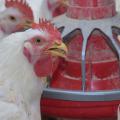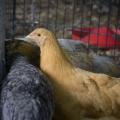Causes of Poor Feathering
The absence of feathers on birds can result from any of several causes and can be separated into two groups: 1) those birds that cannot grow feathers and 2) those birds that pull or break them off. Either situation can be reversed by correcting the problem's cause.
The most common reason that feathers do not develop is a deficiency of a critical protein constituent (amino acid) from the diet of the birds. The feathers of birds contain high levels of a subunit of proteins called "methionine." Methionine is one of only a few amino acids that contain sulfur, and sulfur is a major constituent of feathers. If bird diets are deficient in any single amino acid, it will most likely be methionine. An adequate level of methionine is required in the diet and a deficiency results in reduced growth and feather development. A methionine deficient bird will tend to eat feathers in an attempt to satisfy a craving for this amino acid. A bird may even pull them from its own body.
Few ingredients used in making poultry diets contain adequate amounts of methionine, so manufactured methionine must be added to the dietary mixture to ensure that the birds receive an adequate amount. All quality poultry feeds are designed to contain adequate methionine and prevent reduced body growth and feather development. However, if additional grains (such as corn) are fed with the complete feed, then the amount of methionine consumed by the bird can be inadequate for providing growth and feather development. Feeding of additional grains with complete poultry feeds is not recommended.
If feathers are developed, but are pulled or broken off, the cause is usually management related. Birds that frequently mate may have an absence of feathers, especially on the backs and heads of hens. The males may also have feathers missing from the breast area. These feathers will grow back after the breeding season is completed. Consult the publication Solutions for Poultry for recommendations for the supplementation of methionine when feeding methionine deficient diets.
If feathers are missing from the abdominal and vent area, the cause is most likely the presence of external parasites such as the northern fowl mite or poultry lice. Infestations of these pests can be controlled by regular sprayings of an approved pesticide like permethrin to the birds. The house and other structures that the birds frequently visit should also be sprayed. This will ensure the elimination of any pests that can reinfest the birds. Several applications at 2 to 3 week intervals will kill pests that hatch from eggs that have been deposited prior to the initial spraying. Consult the publication External Parasite Treatments for approved treatments used on poultry.
Publications
News
STARKVILLE, Miss. -- Until an avian flu vaccine for chickens or other alternative is federally approved, commercial poultry operations in the U.S.
STARKVILLE, Miss. -- If egg prices have seemed higher than ever lately, it’s because they are, and consumers can place much of the blame squarely at the feet of the ongoing bird flu outbreak.
With highly pathogenic avian influenza, or HPAI, in the environment in Mississippi, owners of backyard flocks have to take extra steps to keep their chickens healthy.
Avian influenza poses an extremely low risk to human health and none to food safety in Mississippi, but its presence poses a risk to backyard flocks and the state’s $3 billion commercial poultry industry.







